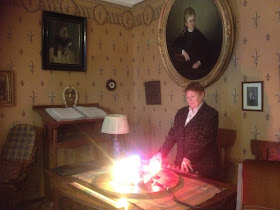Stunning encounter with Scriabin's Third Symphony at the RFH the other night made me realise I never posted on JDCMB the article I wrote about him during the Proms, all about the grandiose excesses and giant dreams of this very tiny Russian (honestly, you should see his evening suit, which is on display in his flat in Moscow...). Oliver Knussen, who was conducting the Poem of Ecstasy and arranged some piano pieces for orchestra which were played on Saturday evening, had some fascinating things to say, too. It was in the Independent on 1 August. Here goes.
 |
| Scriabin's Bechstein, in the composer's Moscow apartment |
A tiny man with a vast imagination, Alexander Scriabin is possibly the most intriguing of the composers whose anniversaries are marked at this year’s Proms. He died aged only 43 exactly a hundred years ago and the Prom on 6 August features his Poem of Ecstasy, a work that represents the very pinnacle of his exotic, even erotic musical language.
The late Ken Russell once wrote a radio play entitled The Death of Alexander Scriabin, in which the composer encounters the occultist Aleister Crowley; the notion is fictional, yet has its appeal, for the spellbinding darkness of Scriabin at his best can resemble musical black magic. From an aristocratic and military family in Moscow, he started out composing piano music much influenced by Chopin, but later became preoccupied with mysticism and theosophy. He dreamed of creating as his magnum opus a multimedia work, Mysterium - “a grandiose religious synthesis of all arts which would herald the birth of a new world,” he wrote – for performance in the Himalayas, but did not live to complete it.
The British composer Oliver Knussen is conducting the Poem of Ecstasy at the Proms; he says he has been under Scriabin’s spell since boyhood. “The uniquely sensuous and hypnotic harmonic world, fabulous orchestral colours, and textures teeming with Fabergé-like detail have exerted a powerful attraction for me since my teens,” Knussen says. “It's especially seductive music to accompany the time when one's hormones are ragingly active – but the fascination has deepened over the years.
 |
| The museum curator displays Scriabin's lightbox |
“Scriabin’s mystical side was of enormous creative importance to him; his writings belong firmly in the world of Madame Blavatsky, et al; and the self-glorifying messianic ambitiousness certainly got out of control towards the end of his life,” he remarks. “But it is the quality and originality of the music itself that is most important. Scriabin made his own surprisingly rational way into a world of extreme chromaticism completely independently of Schoenberg. One wonders how this might have developed had he not died at 43.”
Scriabin’s Moscow apartment is now a museum: the composer’s piano takes pride of place and is often played by visiting pianists making a pilgrimage; and his diminutive evening suit is on display - he was just over five feet tall. On his desk stands a wood-mounted circle of six different-coloured electric bulbs, which can light up in various combinations.
This modest device aided and abetted Scriabin as he composed his Prometheus – The Poem of Fire, an attempt to bring his synaesthesia (the correlation of two senses, here sound and colour) directly into his music. Colour in relation to tone is written in to the score at one point; orchestras sometimes attempt to include it with the use of coloured light. Knussen does not quite approve: “It’s most often an embarrassment unless done with great care and taste,” he says. “Scriabin's music is too strange and subtle to be treated as some sort of proto-hippie/rave lightshow.”
It is also too significant and influential for that. The Poem of Ecstasy was considered startlingly modern on its first hearing in 1908: “Prokofiev in his diary says that he went to a rehearsal together with Miaskovsky and that neither of them understood it at all,” Knussen recounts. “But Stravinsky certainly did; although he was rude about Scriabin in later life, neither The Firebird or Le Rossignol would sound as they do without Scriabin in the background.
“I myself have been profoundly influenced by Scriabin’s harmony,” he adds, “which to me is embarrassingly easy to hear in, for example, my Third Symphony, Where the Wild Things Are, and especially my piano music. As I said, once you're hooked, you're hooked.”



